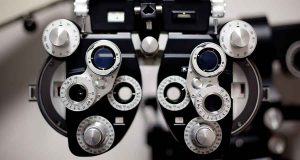 When I was in the fourth grade, we figured out that I needed glasses. I was complaining about having trouble reading what was on the blackboard and after moving to the front row didn’t solve the problem, I was dispatched to an eye doctor. Sure enough, I was nearsighted. A few weeks later I got my first pair of glasses.
When I was in the fourth grade, we figured out that I needed glasses. I was complaining about having trouble reading what was on the blackboard and after moving to the front row didn’t solve the problem, I was dispatched to an eye doctor. Sure enough, I was nearsighted. A few weeks later I got my first pair of glasses.
I particularly remember the sense of wonder at discovering that street signs were something you were supposed to be able to read from inside the car as you drove by. My eyes weren’t shaped to see the world in 20/20 on their own but I inhabited a world where a simple prosthetic compensated for that limitation.
I also lived in a world and a time when nuns were quite happy to provide the structure and discipline a daydreaming young boy might need to complete his lessons. External supports, innate curiosity, and a few extra IQ points took me a pretty long way.
I survived—actually thrived—for a long time because I operated in environments that offered supports matched to my deficits. I was well into my 40s before I suspected that I had ADD. As my responsibilities and environment changed, I kept trying to get closer to the blackboard until I ran out of rows. What I didn’t have was a way to figure out what constituted glasses or how to get the right prescription.
What I had instead was a story of the Peter principle in action. I had blown past my abilities. My credentials were accidental; past performance is not an indicator of future performance. Now, it also turns out that ADD and depression are often correlated, so add that to the equation.
Having a way to name what was going on was a necessary but not sufficient step. It made it possible to have productive conversations with the experts. We experimented with the various meds that worked for many, but not for me. The compensating strategies I had developed over time were matched to environments I no longer operated in. One choice would have been to return to a matching environment. Unfortunately, those environments have continued to shrink in our modern world.
So that leaves the choice of formulating a prescription that lets me see the board in front of me. The benefit of this particular metaphor is that I don’t have to be discouraged when a prescription that works for some doesn’t work for me.
The tricky part is that we talk more about what the prescription is than we do about why and how it works. When we talk about eyesight, we know how to assess and correct for myopia and astigmatism. And we know why the corrections work. When we’re trying to compensate for deficits in managing focus and attention doing complex knowledge work, we have to dig deeper and build provisional theories as we experiment.
This is clearly a work in progress. I am curious about how others might be tackling presumably similar challenges of matching their work practices to the unique demands of their environments? What metaphorical myopias and astigmatisms are you dealing with? How have you gone about designing and implementing corrections that work?